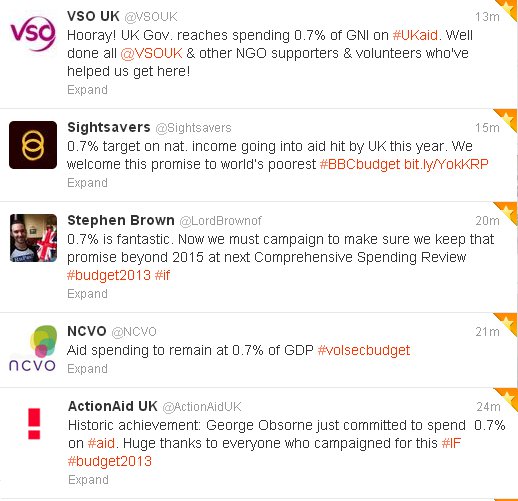International aid charities have expressed joy at the news in the Chancellor's Budget that the UK is the first of the G8 nations to deliver on its 0.7 per cent aid promise, 40 years after it was made.
Announcing not only that the pledge to spend 0.7 per cent of the UK's gross national product on international aid remains a commitment, but that it has now become a reality, George Osborne said: "We should all take pride as I do in this historic achievement for our country."
The sentiment was echoed by Sightsavers' director of policy Dominic Haslam who said the announcement was a "landmark achievement for UK aid".
"A level of stable, predictable aid financing is an essential part of the mix of resourcing needed for development. By reaching the globally-agreed 0.7 per cent target, the UK is contributing its fair share," he said.
"Discussions must now start to focus on the more important questions of how and where UK aid can be most effectively spent – such as to support the billion people who live with disabilities worldwide," Haslam advised.
Having pre-empted the news, Oxfam celebrated with a video (below) featuring a montage of international beneficiaries and containing a simple message: "You should be proud."
With the video Oxfam posted the message: "In 1970, 22 countries committed to the 0.7 per cent aid promise. So far, only five have delivered. But on 20th March 2013, even in tough times, the UK has made good on its own promise. We're the first G8 country to do so, in the year that we host the G8.
"This Budget announcement is an incredible achievement. Not everyone wanted the government to keep its promise to the world's poorest people. But your voice was so strong the government had no choice but to do the right thing.
"This is one massive thank-you."
Jeremy Lefroy, a Conservative MP sitting on the International Development Select Committee said that the commitment is "absolutely right" and that it was "an investment for our future":
"Most of the countries with which we are working are growing economically and should, within a relatively short period of time, no longer need assistance. They are also already major customers for UK goods and services. Six of the ten fastest growing countries in the world, for instance, are in sub-Saharan Africa. The contact we have with them and the support they receive now is already putting us in a good position to make the most of these trade and investment opportunities," he said.
Cafod commented: "Our supporters from across the Catholic Community in England and Wales have consistently worked to achieve this goal believing that saving and improving lives through aid is a moral duty and remains a crucial part of effective development. The aid budget not only saves lives but allows people to stand on their own two feet through supporting essential services such as health and education that enable people to thrive. Crucially, it also supports governments to build the vital long-term infrastructure in areas such as finance and the law to allow for example better revenue collection.
"The UK is at the forefront of effective and transparent aid spending, and we should celebrate the fact that the UK is recognised around the world for targeting its aid where it is needed most and not to support political ends."
The charity added, however that aid spending is not all that should be done to improve the global economy. "If poor countries are to prosper we need to go beyond aid and address issues such as the transparency of business, giving small enterprises the support they need and climate change which is already having devastating effects amongst the communities we work," said the charity, calling for support for the recently-launched IF campaign.
About the 0.7 per cent target
The 0.7 per cent pledge was initially made by the UK and 21 other nations in 1970 General Assembly Resolution. In 2000 it was given a deadline of 2015 as one of the Millenium Development Goals set out by the UN. It is believed that global extreme poverty could be halved if all countries maintained this commitment. So far 16 countries have agreed to meet this target by 2015, the UK making the sixth nation to have actually achieved the pledge.
A number of charities took to Twitter to celebrate:

More Budget reactions can be seen in our live blog here.








